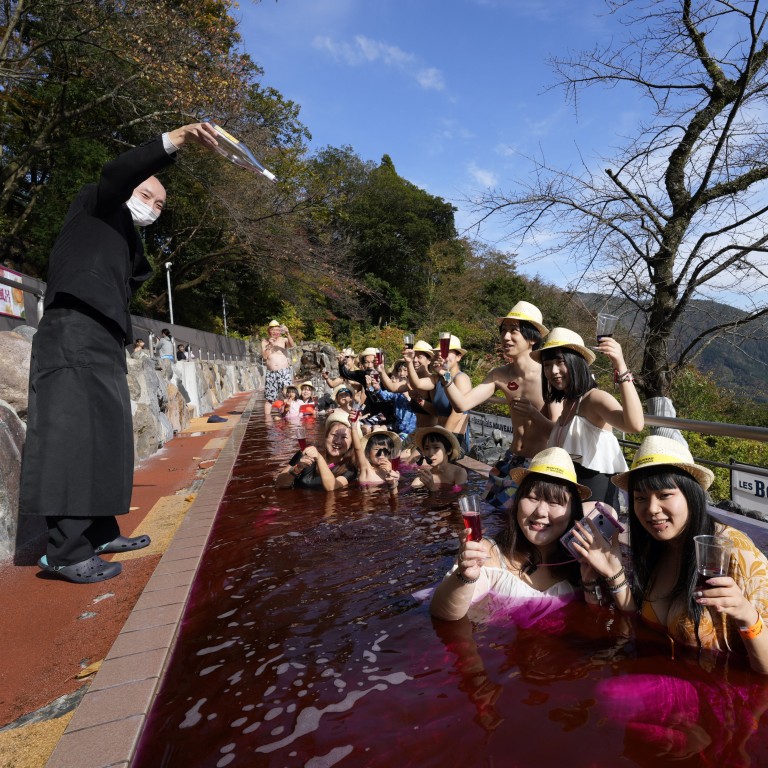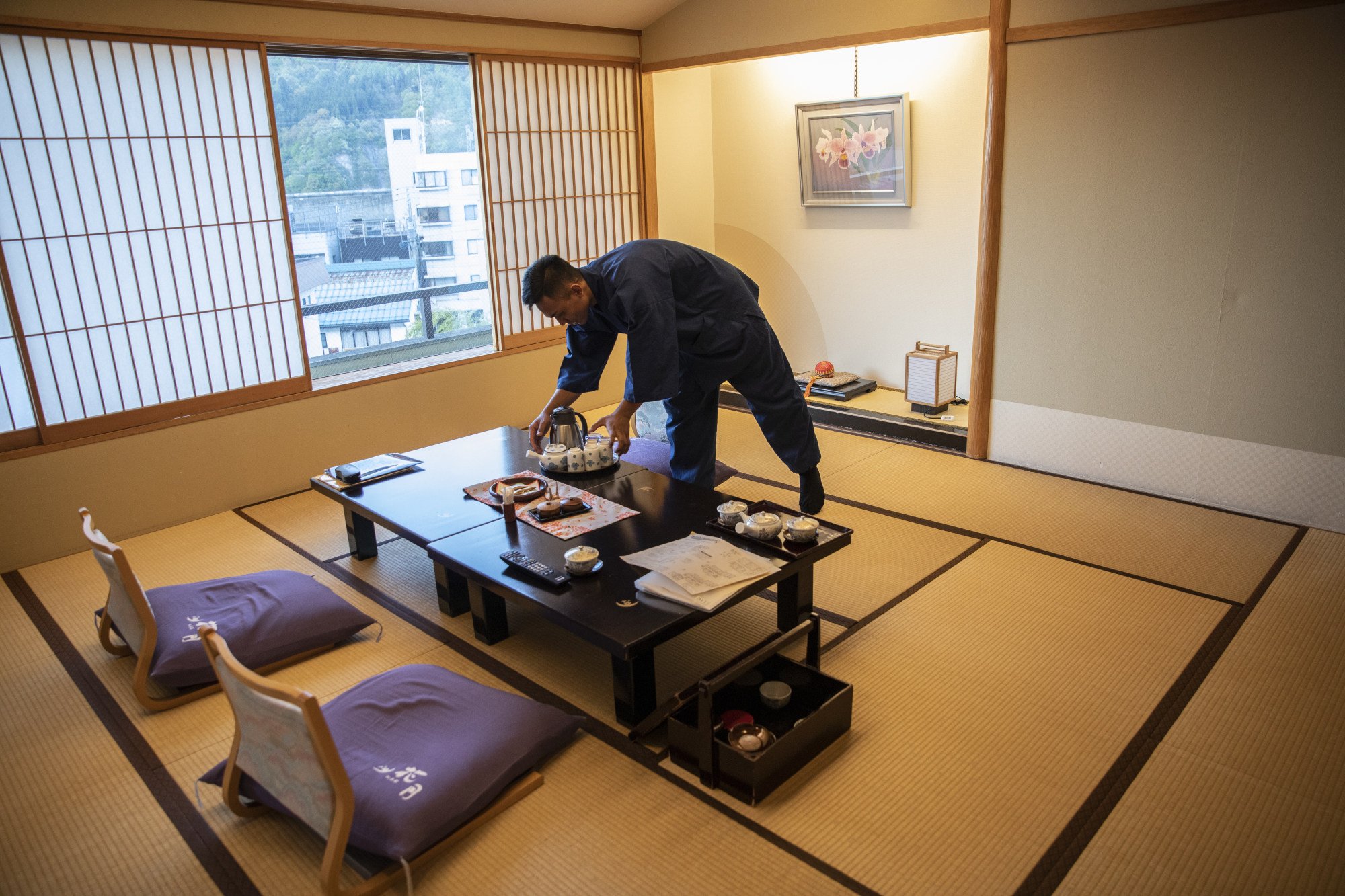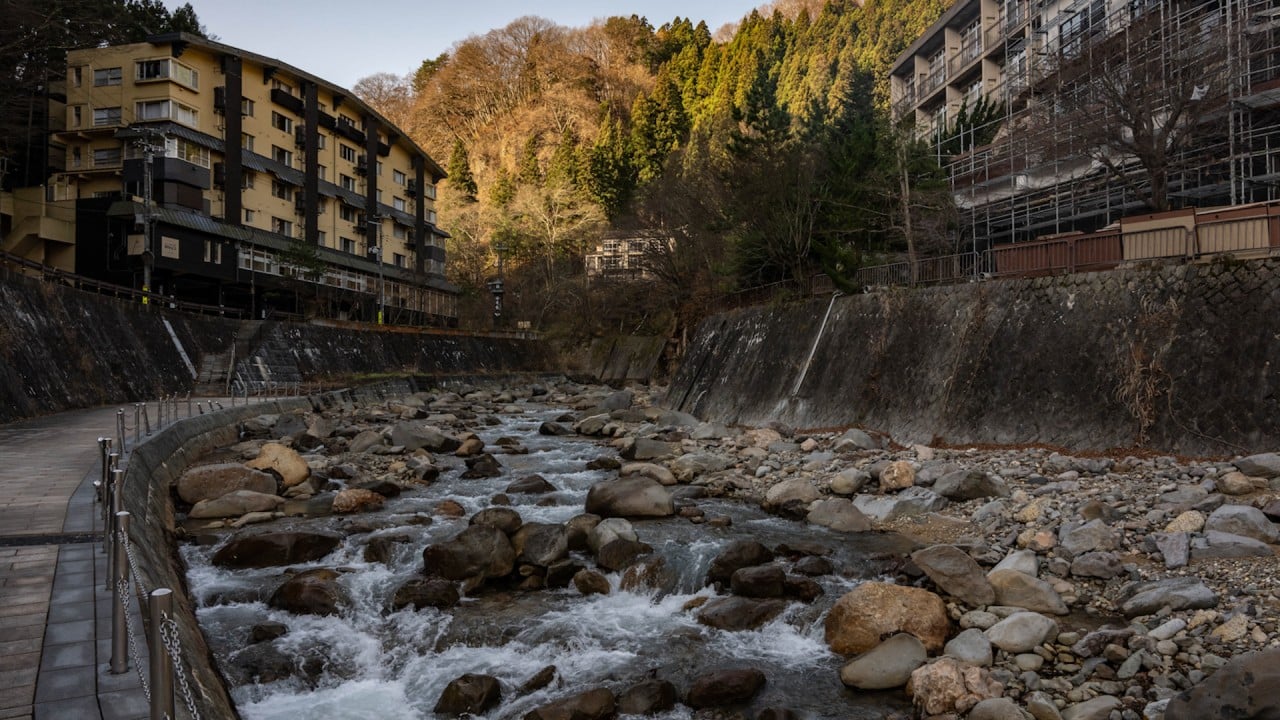
Chinese cash keeps Japan’s struggling hot spring resorts popular with honeymooners bubbling
- An exodus of money from China has turned into a lifeline for cash-strapped inns and hotels fighting to survive after years of Covid curbs
- Some are also looking for business opportunities that will help them gain residency in Japan, but deep-seated mistrust of outsiders, and of Chinese in particular, remains a barrier
A once-faded Japanese honeymoon hotspot is getting a new lease on life thanks in part to Chinese investment, as industry insiders predict that more hot spring hotels will be the beneficiaries of an exodus of money from China.
Things turned around in 2017 when a Hong Kong-based company bought the dilapidated premises and spent 25 billion yen (US$186 million) transforming it into a facility boasting 87 rooms, each with its own open-air hot spring bath and butler service. Following the cash injection from Glory Champion Enterprises Ltd., the Atami Pearl Star Hotel opened in September last year.
Tsuruya is among the highest-profile targets of such investment by Chinese people, and more are likely to be sold to foreigners as inns and hotels struggle to overcome the effects of Covid. Many of the buyers are likely to be Chinese, who are often willing to pay twice the market price to take them over, according to sellers and industry sources.
Japan to track land sales near army bases amid China, Russia, N Korea concerns
“In 10 years about 40 per cent of inns will be owned by foreigners,” said Yuji Tsuji of the Hotel and Inn Research Centre, which also acts as a real property agent. He added that he is seeing a rise in requests from traditional inn, or ryokan, owners who want to sell to foreign buyers, and a rapid increase in inquiries from Chinese looking for inns to buy.
Overseas buyers made up almost half of Japanese hotel deals that closed in the year to March, according to MSCI Real Assets. High-profile hotels such as the Rihga Royal Hotel in Osaka and the Tokyo Hyatt Regency are among the assets that have changed hands recently.
Japan’s tourism industry enjoyed a steady boom from 2012 until the pandemic, as the government sought to attract inbound tourists and the yen weakened. Many traditional ryokan, however, have struggled to attract enough foreign visitors to stay afloat as they fell behind more modern hotels in adapting to things like online bookings or multilingual services, while holding on to other traditions.
For Chinese investors, it’s important to hold their wealth outside China, and Japan is very close to China, so that’s one reason for the increased interest
Many ryokan for example serve fixed-menu meals in the guest’s room as part of a rigid package – a custom that some, including the Atami Pearl Star, are starting to rethink. Offering food and accommodation separately gives guests more freedom, while area residents or day trippers can enjoy meals without needing to spend the night.
The predicted influx of Chinese investment into Japan also comes as rich individuals increasingly explore the country as a place to invest or even live.
Among the wealthy Chinese who have spent time in Japan recently is Alibaba Group Holding Ltd. founder Jack Ma, who lingered for months in the country following Beijing’s sweeping crackdown on the tech sector. Alibaba owns the South China Morning Post.
The weak yen and market stability have made Japanese real estate more attractive for international investors.
“For Chinese investors, it’s important to hold their wealth outside China, and Japan is very close to China, so that’s one reason for the increased interest,” said Tom Sawayanagi, a professor at Rikkyo University who teaches hotel management and investment and who previously led the Japan hospitality team at real estate brokerage Jones Lang LaSalle.
Following the government crackdown on the private education sector, some Chinese are also looking for investment opportunities that will help them gain residency in Japan, and better schools for their children, said Mariko Watanabe, an economics professor at Gakushuin University in Tokyo.
The number of Chinese people inquiring about and applying for business management and highly skilled professional visas is rising, according to the Immigration Services Agency of Japan. One of the conditions for applications is to be operating a stable business, so some buyers purchase and run the inns themselves.
However, Sawayanagi warned that it can be hard for potential buyers to get a clear picture of the health of a ryokan because many do not keep the financial statements that are standard for the lodging industry.
Japan inn let germs breed in bathwater as owner ‘didn’t like chlorine smell’
Another barrier to investment can be a deep-seated mistrust of outsiders, and of Chinese in particular. Conservative lawmakers including Minister for Economic Security Sanae Takaichi have lamented Japan’s inability to legally limit land purchases by non-citizens.
The 78-year-old owner of a remotely located luxury ryokan in the western region of Kansai said he began seeking to sell his premises overlooking the Pacific Ocean three years ago, after running the business for 20 years.
While he’s still in negotiations, he said he has received several offers from Chinese nationals at double the level their Japanese counterparts propose. He spoke on the condition of anonymity, saying he feared criticism.

In the mountain resort of Hakone near Mount Fuji, another owner of a guest house said he was keen to sell to a Chinese investor, but is concerned that he might be shunned in the local community and that his daughter might even be bullied in school if he did so. He also spoke on condition of anonymity, citing concern about anti-Chinese prejudice.
He said he had spoken to potential buyers from China who praise the natural surroundings, while Japanese businesspeople balk at paying full price for the ageing premises.
The city of Atami, however, is more open for business than other parts of Japan and resistance to Chinese investment in ryokan is weakening, said Shuji Tatsumi of the city government’s tourism construction department.
“There used to be opposition to Chinese investment because people thought they would sell out quickly,” he said. “But that’s not the case now – the number of companies is increasing and more of them are investing to increase value.”


